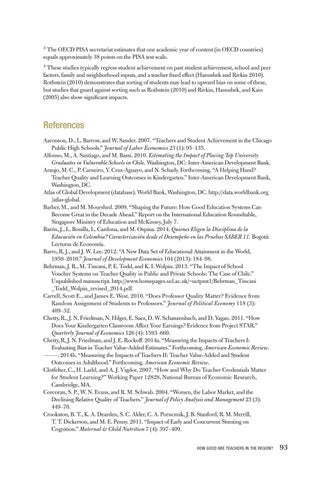3 The OECD PISA secretariat estimates that one academic year of content (in OECD countries)
equals approximately 38 points on the PISA test scale. 4 These studies typically regress student achievement on past student achievement, school and peer
factors, family and neighborhood inputs, and a teacher fixed effect (Hanushek and Rivkin 2010). Rothstein (2010) demonstrates that sorting of students may lead to upward bias on some of these, but studies that guard against sorting such as Rothstein (2010) and Rivkin, Hanushek, and Kain (2005) also show significant impacts.
References Aaronson, D., L. Barrow, and W. Sander. 2007. “Teachers and Student Achievement in the Chicago Public High Schools.” Journal of Labor Economics 25 (1): 95–135. Alfonso, M., A. Santiago, and M. Bassi. 2010. Estimating the Impact of Placing Top University Graduates in Vulnerable Schools in Chile. Washington, DC: Inter-American Development Bank. Araujo, M. C., P. Carneiro, Y. Cruz-Aguayo, and N. Schady. Forthcoming. “A Helping Hand? Teacher Quality and Learning Outcomes in Kindergarten.” Inter-American Development Bank, Washington, DC. Atlas of Global Development (database). World Bank, Washington, DC. http://data.worldbank.org /atlas-global. Barber, M., and M. Mourshed. 2009. “Shaping the Future: How Good Education Systems Can Become Great in the Decade Ahead.” Report on the International Education Roundtable, Singapore Ministry of Education and McKinsey, July 7. Barón, J., L. Bonilla, L. Cardona, and M. Ospina. 2014. Quienes Eligen la Disciplina de la Educación en Colombia? Caracterización desde el Desempeño en las Pruebas SABER 11. Bogotá: Lecturas de Economía. Barro, R. J., and J. W. Lee. 2012. “A New Data Set of Educational Attainment in the World, 1950–2010.” Journal of Development Economics 104 (2013): 184–98. Behrman, J. R., M. Tincani, P. E. Todd, and K. I. Wolpin. 2013. “The Impact of School Voucher Systems on Teacher Quality in Public and Private Schools: The Case of Chile.” Unpublished manuscript. http://www.homepages.ucl.ac.uk/~uctpmt1/Behrman_Tincani _Todd_Wolpin_revised_2014.pdf. Carrell, Scott E., and James E. West. 2010. “Does Professor Quality Matter? Evidence from Random Assignment of Students to Professors.” Journal of Political Economy 118 (3): 409–32. Chetty, R., J. N. Friedman, N. Hilger, E. Saez, D. W. Schanzenbach, and D. Yagan. 2011. “How Does Your Kindergarten Classroom Affect Your Earnings? Evidence from Project STAR.” Quarterly Journal of Economics 126 (4): 1593–660. Chetty, R, J. N. Friedman, and J. E. Rockoff. 2014a. “Measuring the Impacts of Teachers I: Evaluating Bias in Teacher Value-Added Estimates.” Forthcoming. American Economic Review. ———. 2014b. “Measuring the Impacts of Teachers II: Teacher Value-Added and Student Outcomes in Adulthood.” Forthcoming. American Economic Review. Clotfelter, C., H. Ladd, and A. J. Vigdor. 2007. “How and Why Do Teacher Credentials Matter for Student Learning?” Working Paper 12828, National Bureau of Economic Research, Cambridge, MA. Corcoran, S. P., W. N. Evans, and R. M. Schwab. 2004. “Women, the Labor Market, and the Declining Relative Quality of Teachers.” Journal of Policy Analysis and Management 23 (3): 449–70. Crookston, B. T., K. A. Dearden, S. C. Alder, C. A. Porucznik, J. B. Stanford, R. M. Merrill, T. T. Dickerson, and M. E. Penny. 2011. “Impact of Early and Concurrent Stunting on Cognition.” Maternal & Child Nutrition 7 (4): 397–409. How Good Are Teachers in the Region?
93
